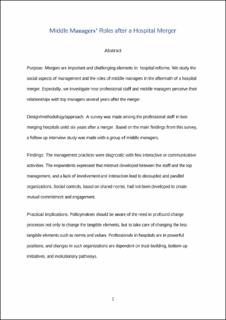Middle managers' roles after a hospital merger
Peer reviewed, Journal article
Accepted version
Permanent lenke
https://hdl.handle.net/11250/2651071Utgivelsesdato
2019Metadata
Vis full innførselSamlinger
- NTNU Handelshøyskolen [1623]
- Publikasjoner fra CRIStin - NTNU [38127]
Sammendrag
Purpose
Mergers are important and challenging elements in hospital reforms. The authors study the social aspects of management and the roles of middle managers in the aftermath of a hospital merger. Especially, the purpose of this paper is to investigate how professional staff and middle managers perceive their relationships with top managers several years after the merger.
Design/methodology/approach
A survey was conducted among the professional staff in two merging hospitals’ units six years after a merger. Based on the main findings from this survey, a follow-up interview study was done with a group of middle managers.
Findings
The management practices were diagnostic with few interactive or communicative activities. The respondents expressed that mistrust developed between the staff and the top management, and a lack of involvement and interaction lead to decoupled and parallel organizations. Social controls, based on shared norms, had not been developed to create mutual commitment and engagement.
Practical implications
Policy makers should be aware of the need in profound change processes not only to change the tangible elements, but to take care of changing the less tangible elements such as norms and values. Professionals in hospitals are in powerful positions, and changes in such organizations are dependent on trust-building, bottom-up initiatives and evolutionary pathways.
Originality/value
The paper addresses the need to understand the dynamics of the social aspect in managing hospitals as knowledge-intensive organizations when comprehensive restructuring processes are taking place over several years.
